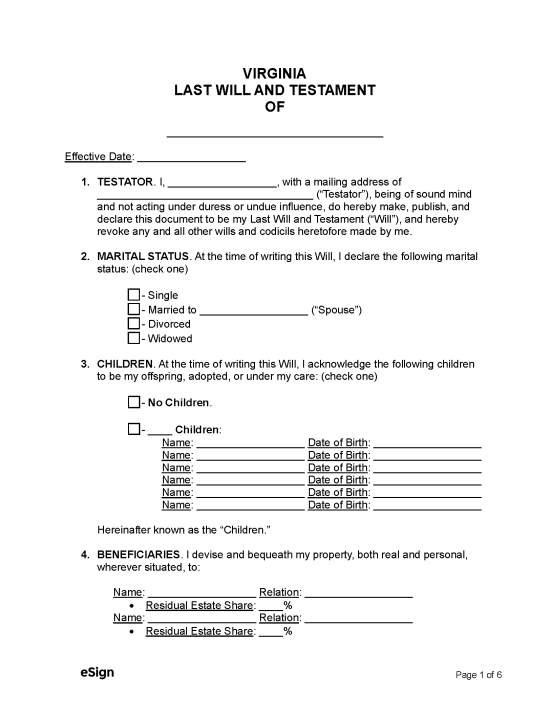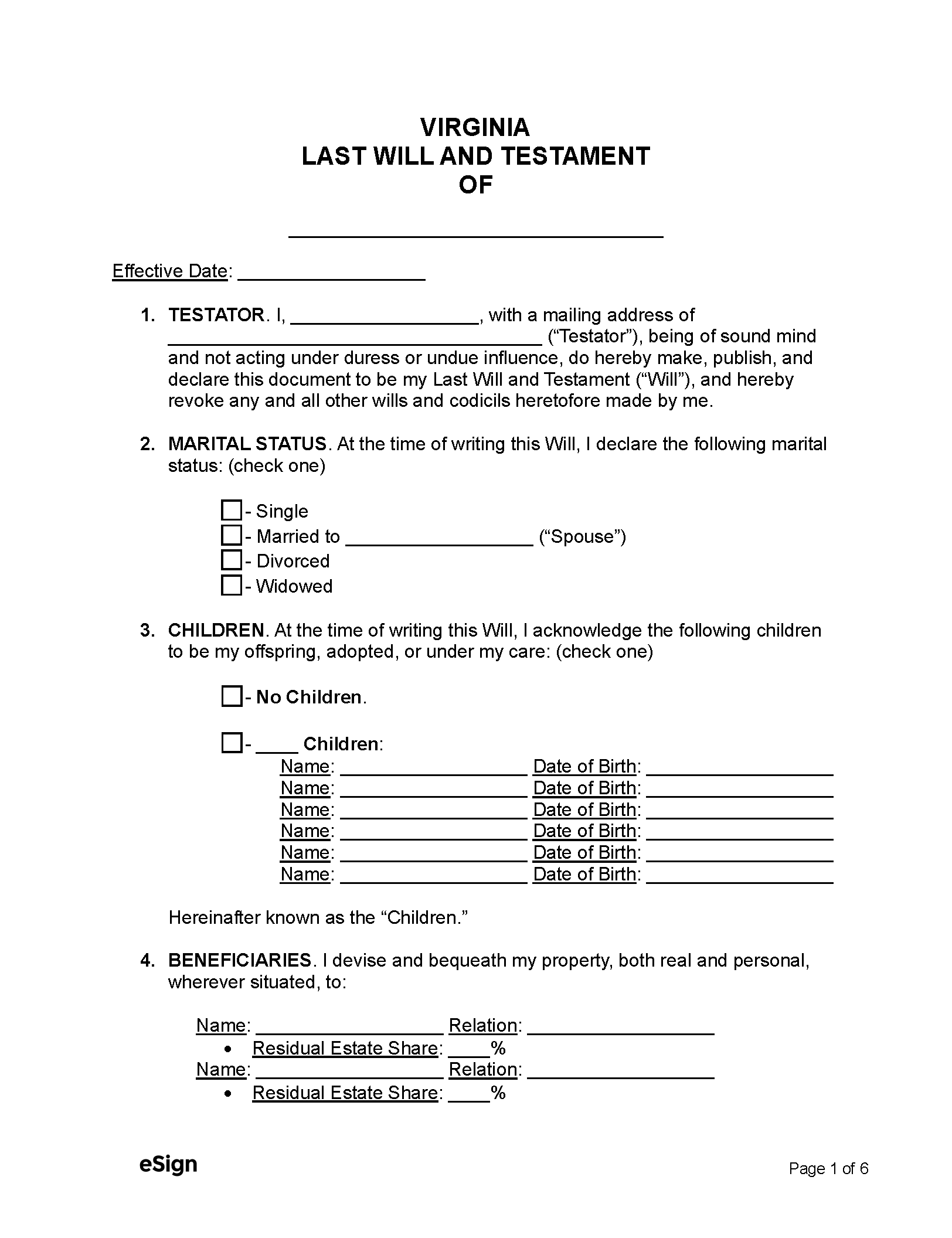A Virginia last will and testament specifies what will happen to the property of an individual when they die. The person drafting the will, known as the testator, will indicate their marital status, list their children, and name the beneficiaries entitled to the estate. In many cases, the testator will select an individual to ensure their final wishes are fulfilled; this individual is referred to as the personal representative or executor.
Anyone in Virginia may make a will as long as they are at least 18 years old and of sound mind.[1]
State Laws
Holographic Wills – A wholly handwritten will is permissible as long as it is entirely in the testator’s handwriting and at least two disinterested witnesses can prove it is authentic.[2]
Revocation – A testator’s will may be revoked if[3]:
- The will is destroyed.
- A new will is executed with language revoking a prior will.
- A new will is executed that is inconsistent with the previous will.
Additionally, if the testator gets a divorce, any powers or property promised to the former spouse will be revoked unless the will states otherwise.[4]
Signing Requirements – The testator and two witnesses must sign the will.
Probate Process in Virginia (10 Steps)
There is no deadline for filing for probate in Virginia, though it is recommended to start the process within 30 days of the testator’s death.[5]
- File the Will and Death Certificate
- Prove the Will
- Qualify the Personal Representative
- Post Bond
- Receive the Certificate of Qualification
- Notify Beneficiaries
- Inventory the Estate
- Pay Debts and Taxes
- Request a Debts and Demands Hearing (If Applicable)
- File a Notice to Show Cause Motion (If Applicable)
- Close the Estate
1. File the Will and Death Certificate
An estate can avoid probate if it contains no real property and the estate’s value does not exceed $50,000.[6] If this is the case, the Small Estate Act Affidavit may be used.
To start the process, the original will and a certified copy of the death certificate (available through the Virginia Department of Health’s online portal) must be brought to the clerk’s office of the circuit court in the county where the testator resided when they died.
If the will does not name an executor or the nominated individual refuses or cannot act as personal representative, the court may select a beneficiary to serve as the personal representative.[7]
These three additional forms are generally also required at the time of filing:
- Probate Information Form – Provides specific information regarding the decedent and the personal representative.
- Probate Tax Return – If the estate value is over $15,000, this document must be filed to determine an estimate of the decedent’s assets subject to tax. This tax is currently 10 cents for every $100 of the estate.[8] The personal representative must pay this tax before the clerk will appoint them.
- List of Heirs – Used to identify the decedent’s family members who would be entitled to inheritance if there were no will.
2. Prove the Will
The clerk must validate the will’s authenticity before admitting it to probate. Some wills are self-proving, meaning an affidavit executed before a notary public is attached to the will.
If the will is not self-proving, the clerk may require the witnesses to complete and sign a Deposition of Witness to Will Without Self-Proving Clause to authenticate the testator’s signature and state of mind at the time of signing.
3. Qualify the Personal Representative
When the clerk is satisfied that the will is authentic and the probate taxes have been paid, the next step is to qualify the personal representative. The individual who intends to act as personal representative must take an oath stating that the will is authentic and that they will carry out their duties to the best of their ability.[9]
Receiving qualification from the clerk is often necessary to transfer assets to beneficiaries or use those assets to pay debts or claims against the estate. The court will also appoint a Commissioner of Accounts to oversee the personal representative’s activities.
4. Post Bond
The personal representative will be required to post bond.[10] This acts as an insurance policy to protect creditors and beneficiaries from any financial losses that may occur due to the personal representative’s actions.
The bond must at least cover the value of the estate’s personal property and the value of the real property if the executor has the authority to sell the real estate.
Bonds often require a surety (a third party) to pay losses if the personal representative fails to uphold their duties. In most cases, the surety will be a bonding company. Virginia law allows surety to be waived if[11]:
- The will states that surety is not required.
- All beneficiaries are personal representatives of the estate.
- The value of the personal estate is $25,000 or less.
5. Receive the Certificate of Qualification
After the personal representative is qualified and has posted bond, the clerk will give them a Certificate of Qualification, sometimes known as letters testamentary, which states that the personal representative has the authority to act on the estate’s behalf.
6. Notify Beneficiaries
Within 30 days of their qualification, the personal representative must send all beneficiaries, heirs, and the surviving spouse (if any) a Notice Regarding Estate.[12] The notice informs the recipient that the personal representative has been appointed and the estate admitted to probate. It also relays the recipients have the right to receive a copy of the accounting, inventory, or decedent’s will.
The personal representative will sign and submit an Affidavit of Notice to Heirs and Beneficiaries to the court stating that proper notice has been provided to all necessary parties. This affidavit must be filed within four months of the personal representative’s qualification.
7. Inventory the Estate
The personal representative will be required to determine the value of each estate asset and file an Inventory for Decedent’s Estate with the Commissioner of Accounts within four months of qualification.[13] The inventory should include:
- All of the decedent’s personal estate that the personal representative is supervising.
- Any real estate that the personal representative has the power to sell.
- Any real estate that is considered an asset of the estate.
- Any of the decedent’s interest in multiple-party accounts and certificates of deposit held by banks and credit unions.
8. Pay Debts and Taxes
It’s the personal representative’s responsibility to ensure all creditor claims against the estate are paid off. However, unlike most other states, Virginia does not require the personal representative to notify creditors of the probate proceedings. If the estate does not have enough funds to pay all the outstanding debts, they must be paid in the following order[14]:
- Administration costs and expenditures
- Specific family allowances
- Funeral expenses (up to $4,000)
- Debts and taxes prioritized under federal laws
- Medical and hospital bills for the decedent’s most recent sickness
- Virginia debts and taxes
- Debts owed as a result of the deceased working as a fiduciary for another
- Debts and taxes owed to Commonwealth municipalities and local governments
- All other claims
The personal representative will also be responsible for handling the tax obligation of the estate and of the decedent. An individual tax return must be filed with the IRS and with the Virginia Department of Taxation. A Federal Estate Tax Return may also need to be filed for very large estates.[15]
If the estate generates more than $600 in income, a Federal Fiduciary Tax Return and a Virginia Fiduciary Tax Return must be filed.
9. Request a Debts and Demands Hearing (If Applicable)
There is no deadline for creditors to make a claim against the estate in Virginia. However, the personal representative can ask the Commissioner of Accounts to hold what’s called a “debts and demands hearing,” that will essentially create a time limit for claims.[16] The Commissioner will publish a notice in the courthouse where the personal representative was appointed and a local newspaper at least ten days before the hearing will take place.
The personal representative must send written notice to known creditors with contested claims at least ten days before the hearing and provide evidence that notice was sent to the court. After the hearing, the Commissioners of Accounts will report all the valid claims, and the personal representative may settle those claims.
10. File a Notice to Show Cause Motion (If Applicable)
If six months have passed since qualification, and an account has been filed (see below), the personal representative can file a motion asking the court for an order compelling all persons with claims against the estate to show cause why final payment and distribution of the estate to the beneficiaries should not be delivered.[17]
The court will issue a Notice to Show Cause (SAMPLE) order. A copy of the order must be published in the local newspaper once a week for two consecutive weeks, stating the date creditors must present themselves before the court to object to the final distribution of assets.[18] If no objections are made at the hearing, the court will enter an Order of Distribution.
11. Close the Estate
When six months have passed since qualification, and all creditor claims have been settled, taxes have been paid, and assets have been appropriately distributed to beneficiaries, the personal representative may complete the Account for Decedent’s Estate. This document shows how the personal representative handled the estate and that the assets have been distributed to beneficiaries in accordance with the will. The estate will be closed once the Commissioner of Accounts approves the final account.

